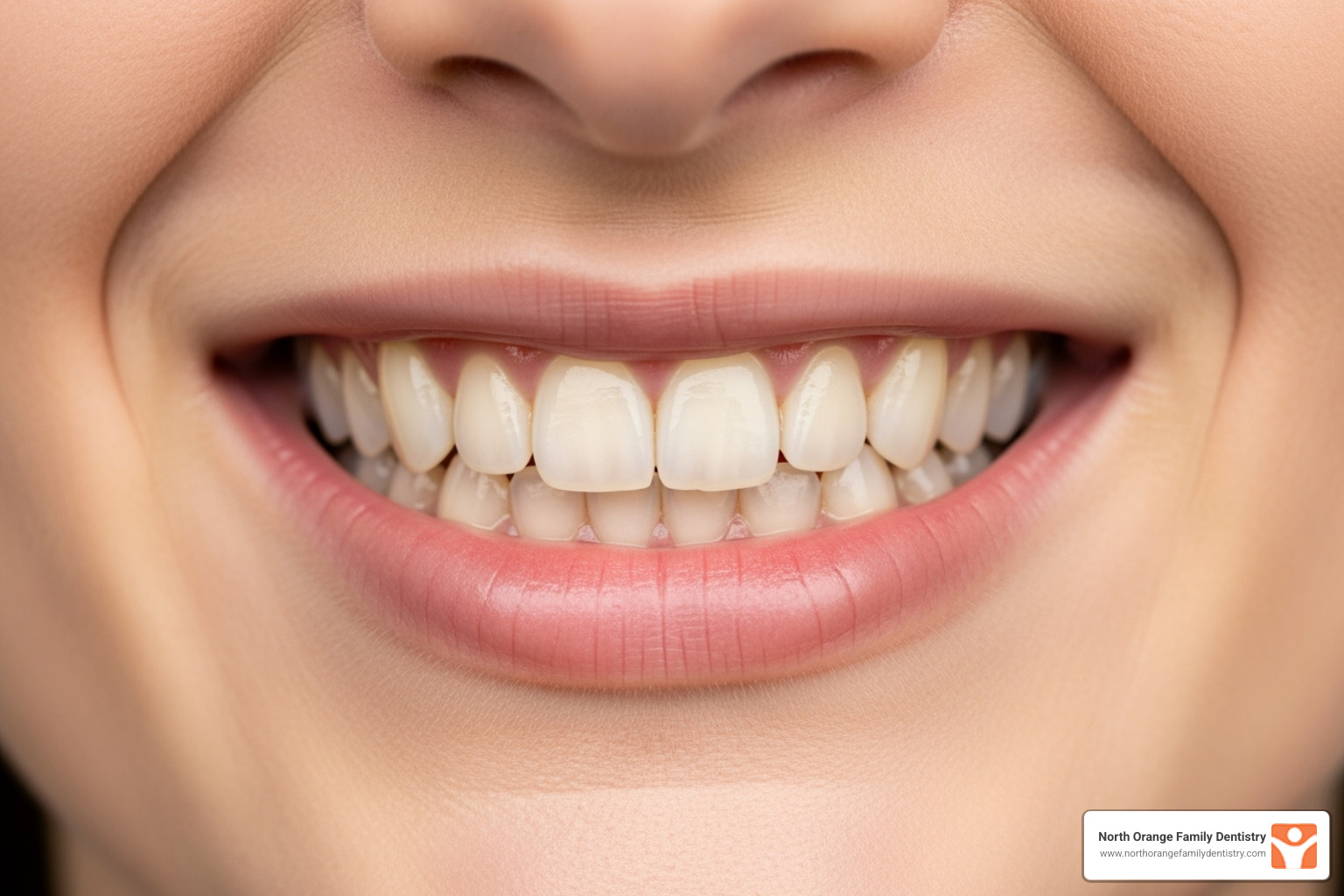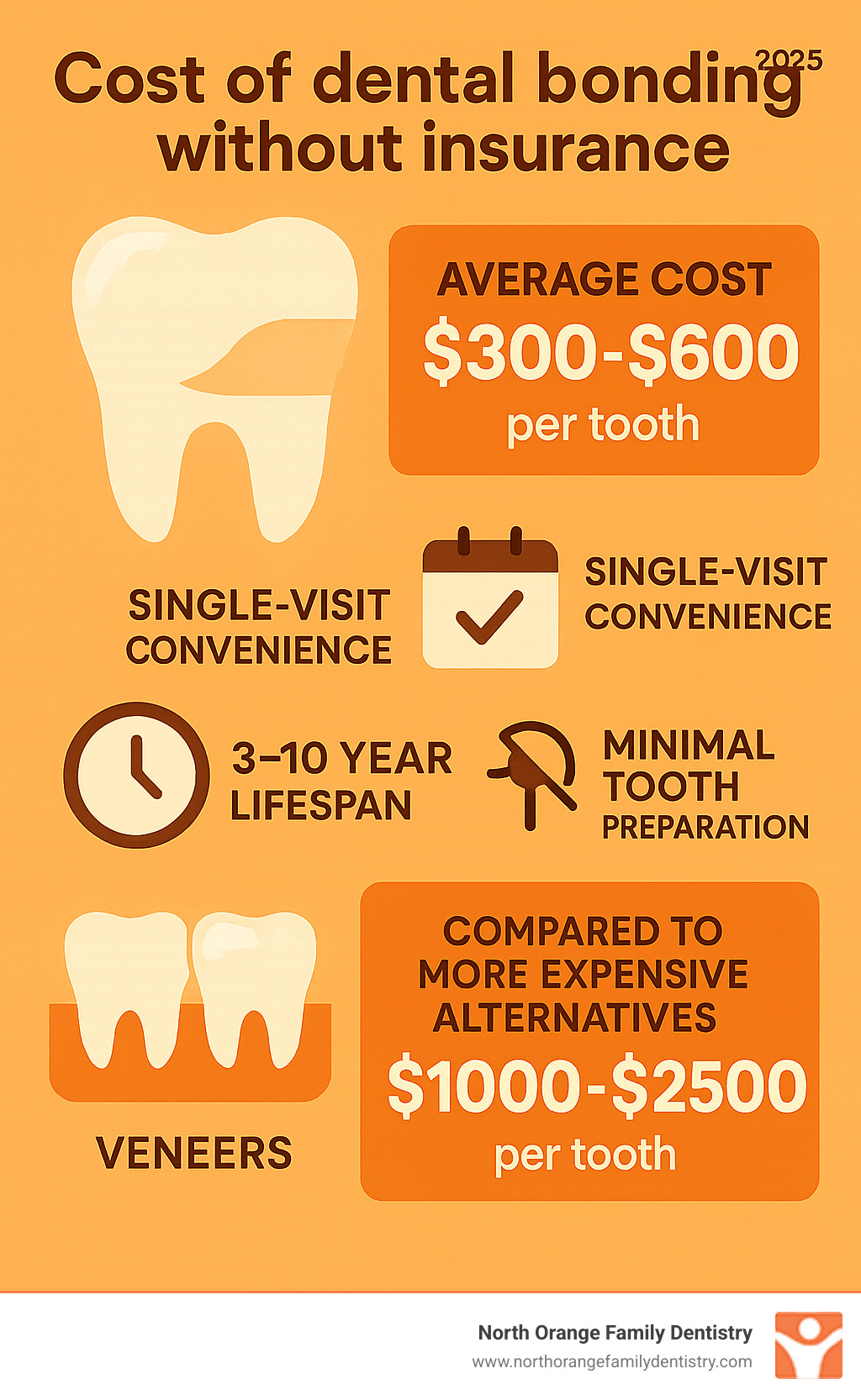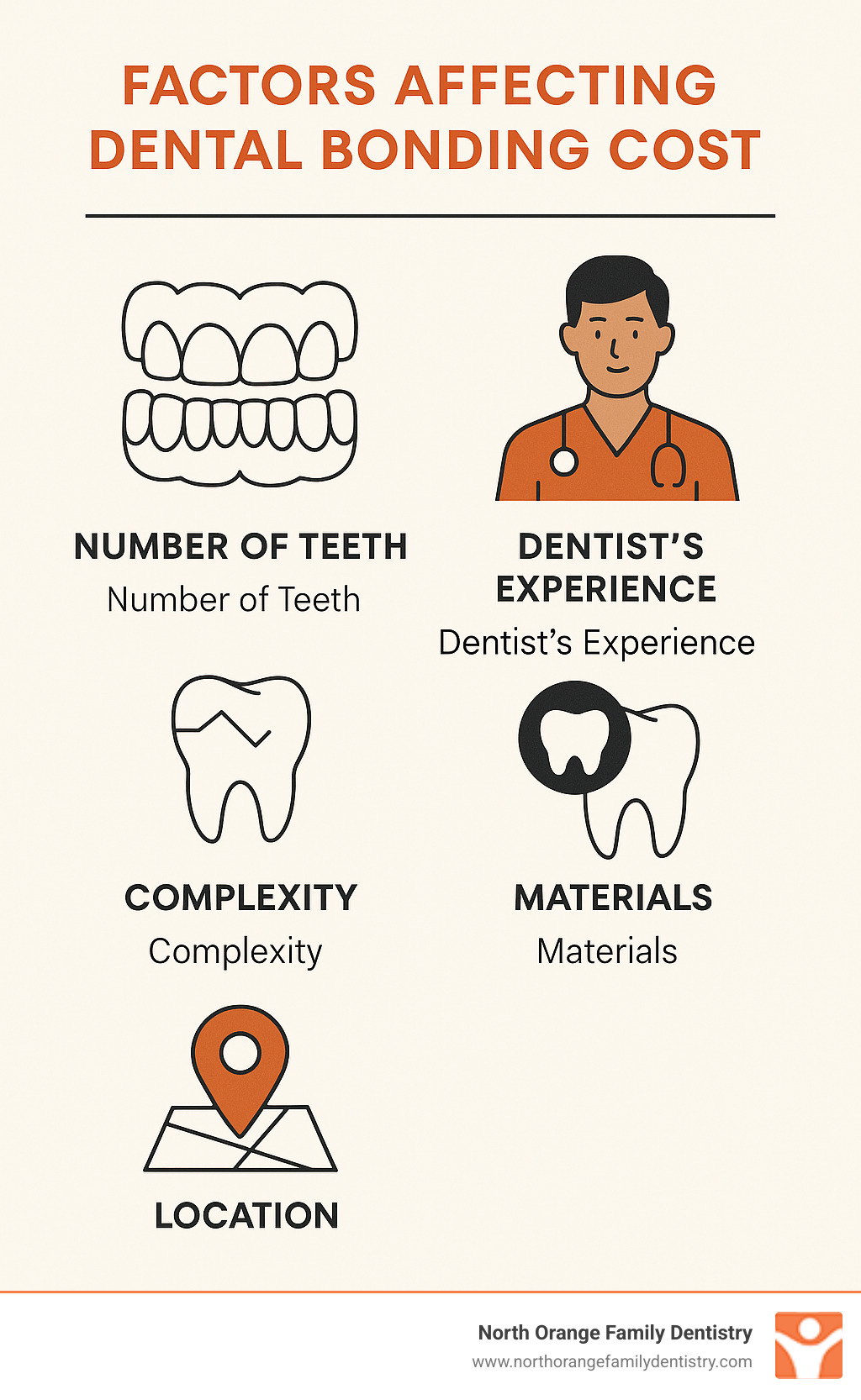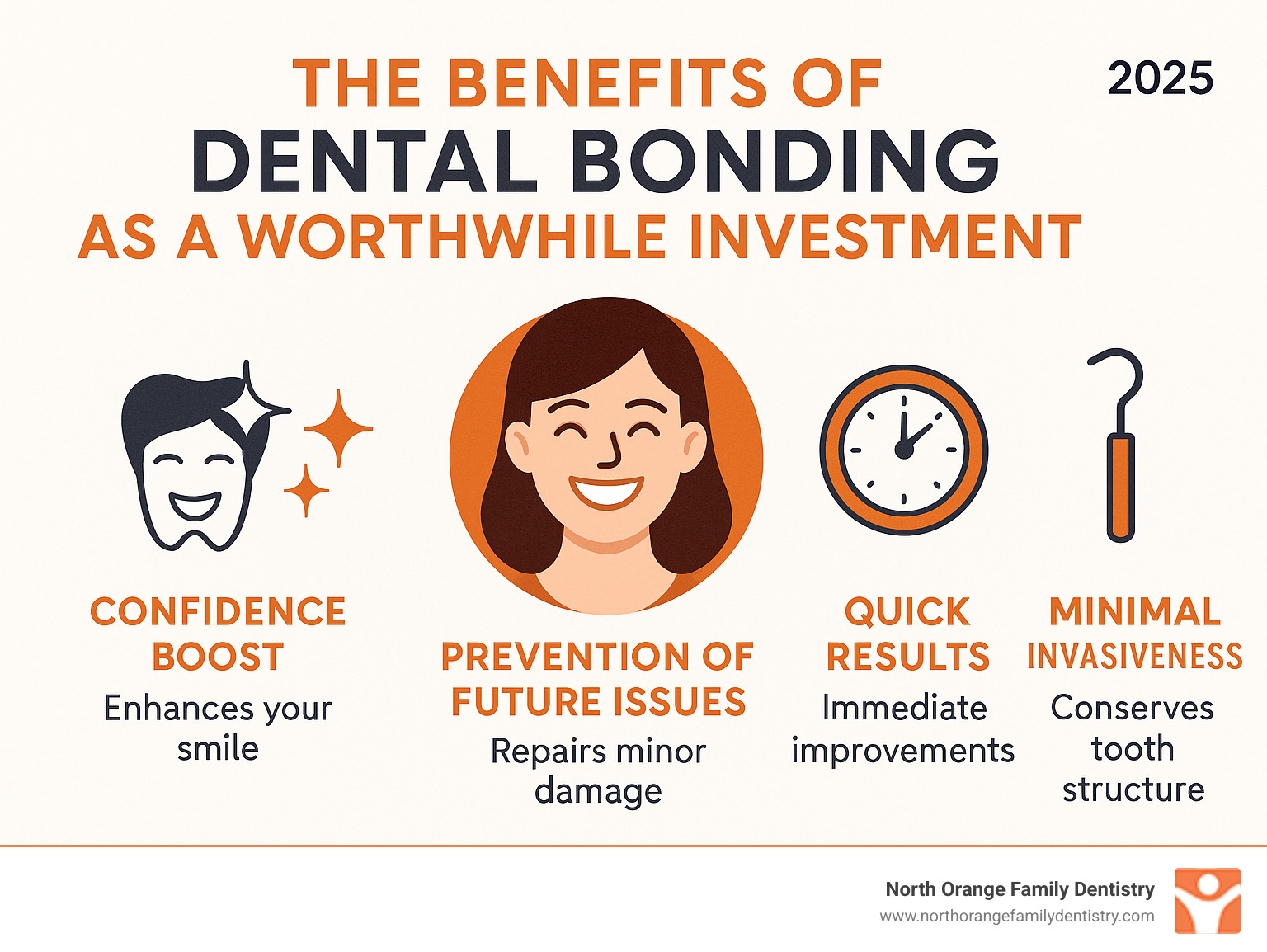
Dental Bonding & Insurance: What You Need to Know About Coverage
Discover the true cost of dental bonding without insurance. Get details on prices, compare to veneers, and find ways to afford your new smile.


Understanding Dental Bonding and Its Value
The cost of dental bonding without insurance typically ranges from $300 to $600 per tooth, making it one of the most affordable cosmetic dental procedures. Here's a quick overview:
- Average cost per tooth: $300-$600
- Procedure time: 30-60 minutes per tooth
- Longevity: 3-10 years with proper care
- Insurance coverage: Limited for cosmetic use, possible for structural repairs
Dental bonding uses a tooth-colored composite resin to fix chips, close gaps, and improve your smile's appearance. Unlike veneers or crowns, bonding is minimally invasive and can often be completed in a single visit.
"Bonding is one of our favorite procedures to do because it is very conservative yet the results can rival crowns or veneers," notes one dental expert. The procedure involves applying a putty-like resin to your tooth, shaping it, and hardening it with a special light.
Bonding offers an attractive combination of affordability, speed, and natural-looking results, providing an immediate fix for chips or gaps.
I'm Dr. Kyle Bogan, founder of North Orange Family Dentistry. My experience as a Fellow in the Academy of General Dentistry has shown me how this conservative procedure can transform smiles while preserving your budget and natural tooth structure. We help families steer the cost of dental bonding without insurance through our comprehensive treatment plans and Dental Wellness Plan.

Cost of dental bonding without insurance basics:
Breaking Down the Cost of Dental Bonding Without Insurance
Understanding the financial commitment for cosmetic dental procedures is a crucial first step. For those without dental insurance, the cost of dental bonding without insurance can seem daunting, but it's one of the most affordable smile improvements available. We're here to detail what influences the price and how it compares to other options.
Average Price Per Tooth and Key Cost Factors
The average cost of dental bonding per tooth varies based on several key factors that determine the final investment for your procedure:
- Procedure Complexity: The more intricate the work, the greater the cost. Bonding a front tooth requires meticulous color matching and artistic sculpting for a natural look, which can influence the fee.
- Number of Teeth: The total investment increases with each additional tooth that is bonded.
- Dentist's Experience: The skill and reputation of your dentist can impact the cost. Highly experienced dentists with advanced training in cosmetic dentistry, like our Dr. Kyle Bogan, a Fellow in the Academy of General Dentistry, may have fees that reflect their expertise, which often translates into superior, longer-lasting results.
- Geographic Location: Dental costs vary by region. At North Orange Family Dentistry in Lewis Center, Ohio, we offer competitive pricing that reflects both our quality of care and the local economic landscape.
- Materials Used: We use premium-grade composite resins that offer superior aesthetics and durability, contributing to the success and longevity of your bonded teeth.
Understanding these factors helps clarify the cost of dental bonding without insurance. For more details, explore:

How Does Bonding Compare to Veneers or Crowns?
When enhancing your smile, it's helpful to compare bonding with other popular procedures like veneers and crowns. They differ in cost, invasiveness, and longevity.
Here's a quick comparison:
| Feature | Dental Bonding | Veneers | Crowns |
|---|---|---|---|
| Typical Cost | Lower | Medium to High | High |
| Longevity | 3-10 years | 10-20 years (Porcelain), 5-7 years (Composite) | 15+ years |
| Invasiveness | Minimally invasive (little to no enamel removal) | Moderately invasive (enamel removal required) | Highly invasive (significant enamel removal) |
| Number of Visits | Typically 1 | 2 or more | 2 or more |
| Material | Composite Resin | Porcelain or Composite Resin | Porcelain, Metal, or Ceramic |
| Reversibility | Yes | No (irreversible) | No (irreversible) |
| Stain Resistance | Moderate (can stain over time) | High (Porcelain), Moderate (Composite) | High |
- Dental Bonding is the most affordable and least invasive option, ideal for minor cosmetic fixes like chips, small gaps, or mild discoloration. It's completed in a single visit and is reversible.
- Veneers offer a more dramatic and durable smile makeover. These custom-made shells are a larger investment and require removing some tooth enamel, making the procedure irreversible.
- Dental Crowns are for significant tooth damage, covering the entire tooth for strength and protection. They are the most invasive and highest investment option but offer the longest lifespan.
While the upfront cost of dental bonding without insurance is lower, the best choice depends on your specific dental needs and long-term goals.
For a deeper dive, check out:
Are There Additional Costs to Consider?
When budgeting for the cost of dental bonding without insurance, it's wise to consider potential additional expenses for a complete picture of your investment.
- Initial Consultation and Examination: A thorough exam, possibly including X-rays, is needed to assess your oral health and confirm if bonding is the right solution. This may be a separate fee.
- Pre-Procedure Teeth Whitening: Bonding material doesn't whiten. If you plan to brighten your smile, you must do so before your bonding procedure to ensure a perfect color match.
- Treatment of Underlying Issues: Problems like cavities or gum disease must be treated before bonding can proceed. These necessary treatments are a separate cost.
- Follow-up and Maintenance: Regular six-month check-ups are vital for maintaining your bonded teeth and overall oral health. We can polish your bonding during these visits to keep it looking its best.
Our team provides a clear, comprehensive treatment plan, including all associated costs, so you can feel confident in your decision.
To learn more about achieving your desired smile, visit:
Making Bonding Affordable: Insurance, Payment Options, and Long-Term Value
We understand that dental costs can be overwhelming. At North Orange Family Dentistry, our mission is to make quality dental care accessible. Dr. Kyle Bogan and our team believe everyone in Lewis Center deserves a smile they're proud of, which is why we offer practical solutions to make the cost of dental bonding without insurance manageable.
Will Insurance Cover Dental Bonding?
A common question is whether insurance will help with bonding costs. The answer depends on why you need the procedure.
- Structural Repair: When bonding is used to fix a problem, such as a chipped tooth from an accident or to repair decay, insurance often provides coverage. This is considered a necessary restoration.
- Cosmetic Improvement: If bonding is for purely aesthetic reasons, like reshaping a tooth or covering discoloration, most insurance plans will not contribute. They classify these procedures as cosmetic and outside of standard coverage.
Every insurance plan is different. Our experienced team can help you understand your specific benefits and will contact your provider to clarify your coverage before treatment begins.
For more information about the bonding process, you might find this resource helpful: Learn about the dental bonding procedure from Healthline.
Your Options for the Cost of Dental Bonding Without Insurance

If you don't have dental insurance, we've created a solution specifically for you. Our Dental Wellness Plan is an in-house savings plan designed to give individuals and families access to predictable, affordable dental care.
This is not traditional insurance. Key benefits include:
- No insurance needed
- Significant savings on dental bonding and other procedures
- No waiting periods or annual maximums
- Discounted yearly care
We created this plan to remove financial barriers, making quality dental care straightforward and accessible. It's an excellent way to manage the cost of the bonding procedure itself and the regular maintenance visits that help your new smile last.
Is Dental Bonding a Worthwhile Investment?
Absolutely. The most immediate benefit is the confidence boost from a transformed smile. From a practical standpoint, bonding is an excellent investment for several reasons:
- Longevity: It typically lasts 3-10 years with proper care.
- Conservative: It's a reversible procedure that preserves your natural tooth structure.
- Preventative: Addressing small chips or cracks with bonding can prevent larger, more expensive problems like fractures or decay from developing later.
When you choose North Orange Family Dentistry, you're receiving care from a highly experienced team. Dr. Bogan's expertise as a Fellow in the Academy of General Dentistry ensures your bonding is performed with precision and artistry to maximize its appearance and longevity. The cost of dental bonding without insurance is a reasonable investment in your long-term confidence and oral health.
To learn more about how long bonding lasts: Is Dental Bonding Permanent
Ready to explore your options? Schedule a consultation to discuss tooth bonding.

Frequently Asked Questions About Dental Bonding
Here are answers to some of the most common questions we hear about dental bonding and the cost of dental bonding without insurance.
Does dental bonding hurt?
No, dental bonding is a comfortable, minimally invasive procedure. Anesthesia is often not needed unless we are using the bonding to fill a cavity. Any minor sensitivity afterward typically fades very quickly.
How long does the dental bonding procedure take?
One of the best parts of bonding is how fast it is! The procedure usually takes about 30 to 60 minutes per tooth, meaning you can often leave our office with a restored smile in a single visit.
Can dental bonding be whitened?
This is an important point: the composite resin used for bonding does not respond to teeth whitening treatments. If you're considering whitening your teeth, we recommend doing it before your bonding procedure. This allows us to match the bonding material to your new, brighter tooth shade for a uniform look.
Is dental bonding suitable for everyone?
While versatile, bonding is best for minor cosmetic issues. For very large gaps, severe misalignment, or extensive tooth damage, other options like veneers, crowns, or Invisalign might be a better long-term solution. We will discuss the most effective treatment for your unique needs during your consultation.
How do I care for my bonded teeth?
Caring for bonded teeth is similar to caring for your natural teeth. To help your bonding last:
- Brush gently twice a day with a soft-bristled toothbrush.
- Floss daily.
- Avoid chewing on hard items like ice or using your teeth as tools.
- Limit staining foods and drinks like coffee, tea, and red wine.
- Keep up with your regular six-month dental check-ups for professional polishing and care.
Does dental bonding weaken teeth?
No, dental bonding does not weaken teeth. In fact, when used to repair chips or cracks, it adds a protective layer that can strengthen the tooth and prevent further damage, all while preserving your natural tooth structure.
What if my bonded tooth chips or stains over time?
Don't worry! Dental bonding is easily repaired. A minor chip can be fixed with more composite resin, and stains can often be polished away during a regular check-up. If needed, the bonding can also be completely replaced.
We hope this guide has provided a clear understanding of dental bonding. Our friendly team at North Orange Family Dentistry in Lewis Center, Ohio, is here to answer any more questions and help you achieve a healthy, beautiful smile.

Understanding Dental Bonding and Its Value
The cost of dental bonding without insurance typically ranges from $300 to $600 per tooth, making it one of the most affordable cosmetic dental procedures. Here's a quick overview:
- Average cost per tooth: $300-$600
- Procedure time: 30-60 minutes per tooth
- Longevity: 3-10 years with proper care
- Insurance coverage: Limited for cosmetic use, possible for structural repairs
Dental bonding uses a tooth-colored composite resin to fix chips, close gaps, and improve your smile's appearance. Unlike veneers or crowns, bonding is minimally invasive and can often be completed in a single visit.
"Bonding is one of our favorite procedures to do because it is very conservative yet the results can rival crowns or veneers," notes one dental expert. The procedure involves applying a putty-like resin to your tooth, shaping it, and hardening it with a special light.
Bonding offers an attractive combination of affordability, speed, and natural-looking results, providing an immediate fix for chips or gaps.
I'm Dr. Kyle Bogan, founder of North Orange Family Dentistry. My experience as a Fellow in the Academy of General Dentistry has shown me how this conservative procedure can transform smiles while preserving your budget and natural tooth structure. We help families steer the cost of dental bonding without insurance through our comprehensive treatment plans and Dental Wellness Plan.

Cost of dental bonding without insurance basics:
Breaking Down the Cost of Dental Bonding Without Insurance
Understanding the financial commitment for cosmetic dental procedures is a crucial first step. For those without dental insurance, the cost of dental bonding without insurance can seem daunting, but it's one of the most affordable smile improvements available. We're here to detail what influences the price and how it compares to other options.
Average Price Per Tooth and Key Cost Factors
The average cost of dental bonding per tooth varies based on several key factors that determine the final investment for your procedure:
- Procedure Complexity: The more intricate the work, the greater the cost. Bonding a front tooth requires meticulous color matching and artistic sculpting for a natural look, which can influence the fee.
- Number of Teeth: The total investment increases with each additional tooth that is bonded.
- Dentist's Experience: The skill and reputation of your dentist can impact the cost. Highly experienced dentists with advanced training in cosmetic dentistry, like our Dr. Kyle Bogan, a Fellow in the Academy of General Dentistry, may have fees that reflect their expertise, which often translates into superior, longer-lasting results.
- Geographic Location: Dental costs vary by region. At North Orange Family Dentistry in Lewis Center, Ohio, we offer competitive pricing that reflects both our quality of care and the local economic landscape.
- Materials Used: We use premium-grade composite resins that offer superior aesthetics and durability, contributing to the success and longevity of your bonded teeth.
Understanding these factors helps clarify the cost of dental bonding without insurance. For more details, explore:

How Does Bonding Compare to Veneers or Crowns?
When enhancing your smile, it's helpful to compare bonding with other popular procedures like veneers and crowns. They differ in cost, invasiveness, and longevity.
Here's a quick comparison:
| Feature | Dental Bonding | Veneers | Crowns |
|---|---|---|---|
| Typical Cost | Lower | Medium to High | High |
| Longevity | 3-10 years | 10-20 years (Porcelain), 5-7 years (Composite) | 15+ years |
| Invasiveness | Minimally invasive (little to no enamel removal) | Moderately invasive (enamel removal required) | Highly invasive (significant enamel removal) |
| Number of Visits | Typically 1 | 2 or more | 2 or more |
| Material | Composite Resin | Porcelain or Composite Resin | Porcelain, Metal, or Ceramic |
| Reversibility | Yes | No (irreversible) | No (irreversible) |
| Stain Resistance | Moderate (can stain over time) | High (Porcelain), Moderate (Composite) | High |
- Dental Bonding is the most affordable and least invasive option, ideal for minor cosmetic fixes like chips, small gaps, or mild discoloration. It's completed in a single visit and is reversible.
- Veneers offer a more dramatic and durable smile makeover. These custom-made shells are a larger investment and require removing some tooth enamel, making the procedure irreversible.
- Dental Crowns are for significant tooth damage, covering the entire tooth for strength and protection. They are the most invasive and highest investment option but offer the longest lifespan.
While the upfront cost of dental bonding without insurance is lower, the best choice depends on your specific dental needs and long-term goals.
For a deeper dive, check out:
Are There Additional Costs to Consider?
When budgeting for the cost of dental bonding without insurance, it's wise to consider potential additional expenses for a complete picture of your investment.
- Initial Consultation and Examination: A thorough exam, possibly including X-rays, is needed to assess your oral health and confirm if bonding is the right solution. This may be a separate fee.
- Pre-Procedure Teeth Whitening: Bonding material doesn't whiten. If you plan to brighten your smile, you must do so before your bonding procedure to ensure a perfect color match.
- Treatment of Underlying Issues: Problems like cavities or gum disease must be treated before bonding can proceed. These necessary treatments are a separate cost.
- Follow-up and Maintenance: Regular six-month check-ups are vital for maintaining your bonded teeth and overall oral health. We can polish your bonding during these visits to keep it looking its best.
Our team provides a clear, comprehensive treatment plan, including all associated costs, so you can feel confident in your decision.
To learn more about achieving your desired smile, visit:
Making Bonding Affordable: Insurance, Payment Options, and Long-Term Value
We understand that dental costs can be overwhelming. At North Orange Family Dentistry, our mission is to make quality dental care accessible. Dr. Kyle Bogan and our team believe everyone in Lewis Center deserves a smile they're proud of, which is why we offer practical solutions to make the cost of dental bonding without insurance manageable.
Will Insurance Cover Dental Bonding?
A common question is whether insurance will help with bonding costs. The answer depends on why you need the procedure.
- Structural Repair: When bonding is used to fix a problem, such as a chipped tooth from an accident or to repair decay, insurance often provides coverage. This is considered a necessary restoration.
- Cosmetic Improvement: If bonding is for purely aesthetic reasons, like reshaping a tooth or covering discoloration, most insurance plans will not contribute. They classify these procedures as cosmetic and outside of standard coverage.
Every insurance plan is different. Our experienced team can help you understand your specific benefits and will contact your provider to clarify your coverage before treatment begins.
For more information about the bonding process, you might find this resource helpful: Learn about the dental bonding procedure from Healthline.
Your Options for the Cost of Dental Bonding Without Insurance

If you don't have dental insurance, we've created a solution specifically for you. Our Dental Wellness Plan is an in-house savings plan designed to give individuals and families access to predictable, affordable dental care.
This is not traditional insurance. Key benefits include:
- No insurance needed
- Significant savings on dental bonding and other procedures
- No waiting periods or annual maximums
- Discounted yearly care
We created this plan to remove financial barriers, making quality dental care straightforward and accessible. It's an excellent way to manage the cost of the bonding procedure itself and the regular maintenance visits that help your new smile last.
Is Dental Bonding a Worthwhile Investment?
Absolutely. The most immediate benefit is the confidence boost from a transformed smile. From a practical standpoint, bonding is an excellent investment for several reasons:
- Longevity: It typically lasts 3-10 years with proper care.
- Conservative: It's a reversible procedure that preserves your natural tooth structure.
- Preventative: Addressing small chips or cracks with bonding can prevent larger, more expensive problems like fractures or decay from developing later.
When you choose North Orange Family Dentistry, you're receiving care from a highly experienced team. Dr. Bogan's expertise as a Fellow in the Academy of General Dentistry ensures your bonding is performed with precision and artistry to maximize its appearance and longevity. The cost of dental bonding without insurance is a reasonable investment in your long-term confidence and oral health.
To learn more about how long bonding lasts: Is Dental Bonding Permanent
Ready to explore your options? Schedule a consultation to discuss tooth bonding.

Frequently Asked Questions About Dental Bonding
Here are answers to some of the most common questions we hear about dental bonding and the cost of dental bonding without insurance.
Does dental bonding hurt?
No, dental bonding is a comfortable, minimally invasive procedure. Anesthesia is often not needed unless we are using the bonding to fill a cavity. Any minor sensitivity afterward typically fades very quickly.
How long does the dental bonding procedure take?
One of the best parts of bonding is how fast it is! The procedure usually takes about 30 to 60 minutes per tooth, meaning you can often leave our office with a restored smile in a single visit.
Can dental bonding be whitened?
This is an important point: the composite resin used for bonding does not respond to teeth whitening treatments. If you're considering whitening your teeth, we recommend doing it before your bonding procedure. This allows us to match the bonding material to your new, brighter tooth shade for a uniform look.
Is dental bonding suitable for everyone?
While versatile, bonding is best for minor cosmetic issues. For very large gaps, severe misalignment, or extensive tooth damage, other options like veneers, crowns, or Invisalign might be a better long-term solution. We will discuss the most effective treatment for your unique needs during your consultation.
How do I care for my bonded teeth?
Caring for bonded teeth is similar to caring for your natural teeth. To help your bonding last:
- Brush gently twice a day with a soft-bristled toothbrush.
- Floss daily.
- Avoid chewing on hard items like ice or using your teeth as tools.
- Limit staining foods and drinks like coffee, tea, and red wine.
- Keep up with your regular six-month dental check-ups for professional polishing and care.
Does dental bonding weaken teeth?
No, dental bonding does not weaken teeth. In fact, when used to repair chips or cracks, it adds a protective layer that can strengthen the tooth and prevent further damage, all while preserving your natural tooth structure.
What if my bonded tooth chips or stains over time?
Don't worry! Dental bonding is easily repaired. A minor chip can be fixed with more composite resin, and stains can often be polished away during a regular check-up. If needed, the bonding can also be completely replaced.
We hope this guide has provided a clear understanding of dental bonding. Our friendly team at North Orange Family Dentistry in Lewis Center, Ohio, is here to answer any more questions and help you achieve a healthy, beautiful smile.


Contact Us
Have any questions? Want to learn more?


